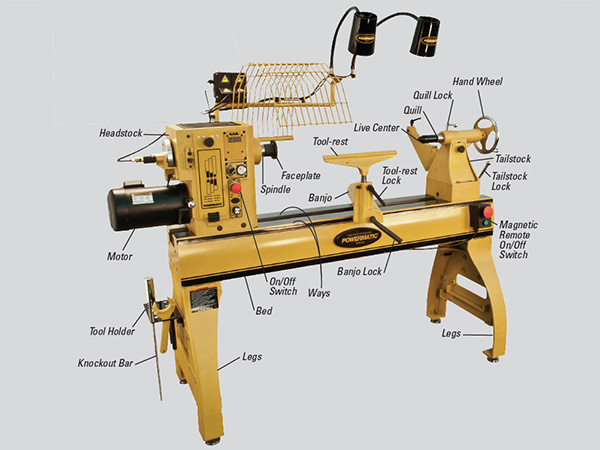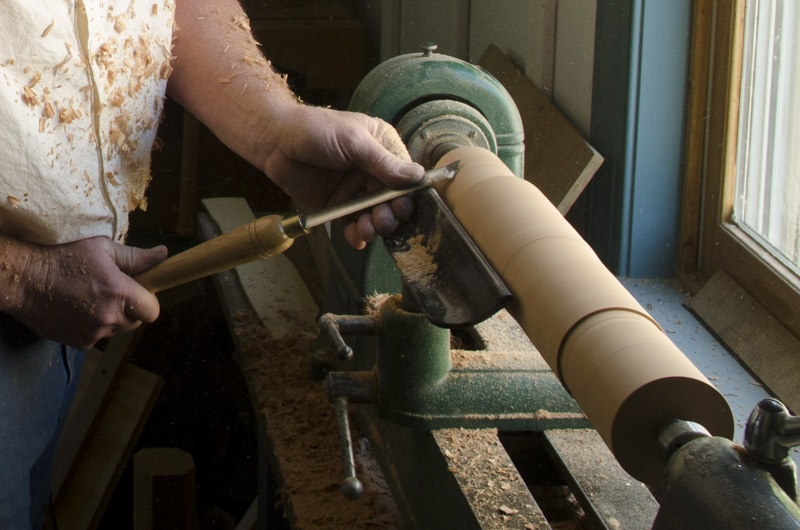Looking for the best woodturning lathe? You’ve come to the right place! Whether you’re a beginner or a seasoned woodworker, finding the perfect lathe can make all the difference in your projects. With so many options available, it’s important to consider the features, performance, and value for money. Let’s dive in and explore the world of woodturning lathes together!
In this article, we’ll take a closer look at some of the top contenders in the market and help you make an informed decision. From compact mini lathes to powerful industrial-grade machines, there’s something for everyone. So, buckle up and get ready to discover the perfect woodturning lathe for your needs and budget.
But wait, there’s more! We’ll also provide handy tips, expert advice, and answer commonly asked questions to ensure you have all the information you need. So, grab a pen and paper, because by the end of this article, you’ll be well-equipped to choose the best woodturning lathe that will take your woodworking skills to the next level. Let’s get started!

The Best Woodturning Lathe: Your Guide to Choosing the Perfect Tool
Woodturning is a popular craft that requires precision and skill. Whether you’re a seasoned professional or just starting out, having the right woodturning lathe can make all the difference in your projects. With so many options on the market, it can be overwhelming to find the best woodturning lathe for your needs. In this article, we will explore the key factors to consider when choosing a woodturning lathe, as well as review some of the top models available.
1. Types of Woodturning Lathes
Woodturning lathes come in various types, each designed for specific purposes. The most common types include benchtop lathes, mini lathes, and full-size lathes. Benchtop lathes are compact and portable, making them ideal for small workshops or beginners. Mini lathes are even smaller and are perfect for crafting small projects like pens and bowls. Full-size lathes, on the other hand, offer more power and stability, making them suitable for large-scale projects and experienced woodturners.
When choosing a woodturning lathe, consider the size of the projects you plan to work on, the space available in your workshop, and your level of experience. It’s also important to choose a lathe that allows for customization and upgrades as your skills and needs evolve.
2. Key Features to Look for in a Woodturning Lathe
When evaluating different woodturning lathes, there are several key features to consider. One of the most important is the motor power. Higher horsepower motors offer better torque and allow you to work with larger and denser materials. Variable speed control is another crucial feature as it gives you more control over the cutting process. Look for a lathe that has a wide range of speed options, both for slow and delicate cuts, as well as high-speed operations.
Sturdy construction and build quality are also vital considerations. The lathe should be made from durable materials that can withstand the vibrations and pressures associated with woodturning. Additionally, check for features like a solid tool rest and a stable base to ensure accurate and safe operation. Finally, don’t forget to consider the availability of accessories and attachments that you may need for specific projects, such as a steady rest or a spindle sander.
3. Top Woodturning Lathes on the Market
Now that we’ve discussed the types and key features of woodturning lathes, let’s take a look at some of the top models available:
1. Jet JWL-1221VS: This benchtop lathe combines power and portability, featuring a variable speed control that allows for precise adjustments. With its sturdy construction and ample workspace, it is a popular choice among both beginners and experienced woodturners.
2. Nova 1624-44: The Nova 1624-44 offers a versatile woodturning experience with its powerful motor and variable speed control. It also features a swing capacity of 16 inches, allowing for larger projects. The solid cast iron construction ensures stability and durability.
3. Powermatic 3520C: The Powermatic 3520C is a top-of-the-line full-size lathe designed for professional woodturners. With its 2 horsepower motor and electronic variable speed control, it can handle even the most demanding projects. The heavy-duty construction provides stability and vibration-free operation.
Remember, the best woodturning lathe for you ultimately depends on your specific needs and preferences. Consider factors like budget, space limitations, and the types of projects you plan to undertake when making your decision.
Tips for Getting the Most Out of Your Woodturning Lathe
Now that you have chosen the perfect woodturning lathe, here are some tips to help you maximize its potential:
1. Sharpen Your Tools
One of the most important aspects of woodturning is working with sharp tools. Dull tools can lead to rough finishes and increased effort. Invest in a good sharpening system and learn how to properly sharpen your chisels and gouges. A sharp tool will not only make the turning process smoother but also produce cleaner and more precise cuts.
2. Practice Safe Techniques
Woodturning involves spinning objects at high speeds, so safety should always be a top priority. Wear protective gear such as safety glasses, a face shield, and a dust mask. Make sure to secure your workpiece properly and use proper tool rests to maintain stability. Additionally, always be mindful of your body positioning and movement to prevent accidents.
3. Experiment and Learn
Woodturning is a skill that improves with practice. Don’t be afraid to experiment with different techniques and wood types. Join a local woodturning club or take classes to learn from experienced turners. The more you explore the craft and push your boundaries, the more you will grow as a woodturner.
In conclusion, choosing the best woodturning lathe involves considering factors like type, features, and quality. By understanding your specific needs and doing thorough research, you can find a lathe that suits your preferences and allows you to create beautiful and precise woodturning projects. Remember to always prioritize safety and continuously improve your skills through practice and learning. Happy turning!
Key Takeaways: What Is the Best Woodturning Lathe?
- Consider the size and weight of the lathe for ease of use and portability.
- Look for a lathe with variable speed control to accommodate different woodworking projects.
- Choose a lathe with a powerful motor to handle larger and more challenging turning tasks.
- Check for a sturdy and stable construction to minimize vibrations during operation.
- Consider the price range and features that align with your budget and woodworking needs.
Frequently Asked Questions
Welcome to our frequently asked questions section about woodturning lathes! Below you’ll find some common queries people have when it comes to choosing the best woodturning lathe for their needs. Take a look at the questions and answers to gain a better understanding of what to consider before making your decision.
1. What factors should I consider when choosing a woodturning lathe?
When selecting a woodturning lathe, several factors come into play. One crucial factor is the size or capacity of the lathe, which determines the maximum length and diameter of the wood you can work on. Speed control is another vital consideration as it allows you to adjust the rotation speed based on the type of wood and project you’re working on. Additionally, you should think about the power of the lathe, as it affects its ability to handle different types of wood and the size of the turning projects you plan to undertake.
Other factors to consider include the construction and stability of the lathe, the availability of accessories and attachments, and the reputation and customer reviews of the manufacturer. By considering all these aspects, you can make an informed decision to find the best woodturning lathe for your needs.
2. What are the different types of woodturning lathes available in the market?
The market offers a variety of woodturning lathes to choose from. Benchtop lathes are smaller and more portable, suitable for hobbyists or those with limited workshop space. Floor-standing lathes, on the other hand, are larger and sturdier, providing better stability and power, making them ideal for heavy-duty turning projects. One must also consider mini or midi lathes, which are a more compact option with mid-sized capabilities.
Moreover, there are also specialty lathes, such as pen lathes for small projects like pens, and bowl lathes designed specifically for creating bowls and other bowl-like objects. Each type of lathe has its own advantages and limitations, so it’s essential to consider the intended use and budget before making a purchase.
3. Can I use any lathe for woodturning, or do I need a specific woodturning lathe?
Woodturning requires a lathe specifically designed for it. While it may be possible to use a general-purpose lathe for small woodturning projects, you may face limitations in terms of stability, power, and control. Woodturning lathes are designed to provide the necessary control, adjustability, and stability needed for precise and safe turning. They often have variable speed control, adjustable tool rests, and other features that make the woodturning process smoother and more efficient.
Investing in a dedicated woodturning lathe ensures you have the right equipment for the job, allowing you to achieve the best results and enjoy the craft of woodturning to its fullest.
4. What is the ideal budget for a woodturning lathe?
The budget for a woodturning lathe can vary greatly depending on the type, size, and brand. Entry-level or basic woodturning lathes can cost anywhere from $200 to $500. These lathes are suitable for beginners or hobbyists who are getting started with woodturning.
However, if you’re a serious woodturner or plan to work on larger projects, mid-range or professional-quality lathes range from $500 to $2000. These lathes offer better construction, enhanced features, and increased power.
For those seeking top-of-the-line lathes with advanced features and exceptional build quality, high-end models can range from $2000 to $10,000 or even more. These lathes are typically used by professional woodturners or those who have a high budget and demand the absolute best performance and durability from their equipment.
5. Can I upgrade my woodturning lathe in the future?
Yes, depending on the specific lathe model and manufacturer, many woodturning lathes offer upgrade options. Some lathes allow you to attach additional accessories or attachments to expand the capabilities of the lathe, such as larger tool rests, bed extensions for handling longer pieces of wood, or even specialized attachments designed for specific woodturning techniques.
Before purchasing a lathe, it’s worth checking with the manufacturer or researching the lathe model to see what upgrade options are available. This way, you can make an informed decision now and potentially expand your lathe’s capabilities in the future as your woodturning skills progress.

Summary
So, let’s recap what we’ve learned about woodturning lathes.
First, consider the size of the lathe and the type of projects you want to work on. A smaller lathe is great for bowls and pens, while a larger one is better for bigger projects.
Next, think about the motor power. More power means you can tackle tougher materials and larger pieces of wood.
Also, pay attention to the speed control. Variable speed lets you adjust the rotation speed to fit different materials and techniques.
Lastly, consider the features and accessories that come with the lathe. Some lathes have helpful extras like built-in lighting and easy-to-use controls.
Remember, the best woodturning lathe for you depends on your specific needs and budget. Take your time to research and choose the one that’s perfect for you.
